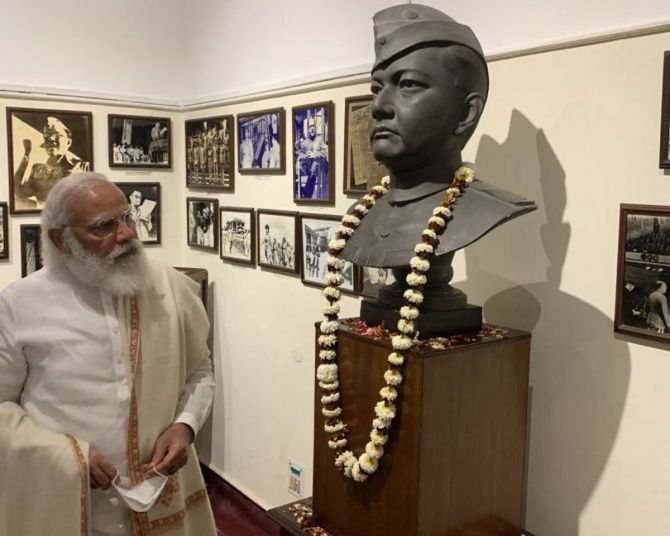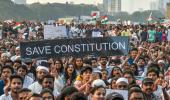'He was always opposed to a form of nationalism that was narrow, selfish and arrogant.'
'He will always remain a beacon of inspiration for freedom-loving people across the world and for movements of resistance against oppressive State power.'

In the run-up to the West Bengal election, Bharatiya Janata Party leaders Narendra Modi, Amit Shah, Jagat Prakash Nadda have invoked Netaji Subhas Chandra Bose several times, calling him the 'true son of mother India'.
On April 4, Modi slammed West Bengal Chief Minister Mamata Banerjee for branding BJP leaders as 'outsiders' and said it is an insult to the inclusive ideology of Netaji Subhas Chandra Bose and principles of the Constitution.
On Netaji's 125th birth anniversary on January 23, 2021, both the BJP and ruling Trinamool Congress vied with each other to honour him -- speeches, coinage, a stamp.
In fact, Modi began reaching out to Bengal immediately after assuming office in 2014. His government began the declassification of the Netaji files, making available in public domain, 200 of a total of 300 files.
If Modi has consistently heaped praise on Netaji, his contempt for Jawaharlal Nehru is also a constant in his speeches.
On February 6, 2020, during a 40-minute speech in Parliament, Modi mentioned Nehru 23 times.
Each time to berate India's first prime minister for perceived lapses in polity and therefore to justify the Citizenship (Amendment) Act.
The BJP's attempt to appropriate Bengal's greatest sons -- Ishwar Chandra Vidyasagar, Rabindranath Tagore, Netaji among others -- during the state-wide rallies has not gone unnoticed, with a TMC leader pointing out caustically that the party should first be able to pronounce the names, never mind appropriating them.
Sugata Bose, a former Rajya Sabha and Lok Sabha MP with the Trinamool Congress, and Netaji's grand-nephew, answers questions put to his alter ego -- Bose, the historian, scholar and author of several books. He is the Gardiner Professor of Oceanic History and Affairs, Harvard University.
Professor Bose responds to an e-mail interview with Swarupa Dutt/Rediff.com on matters that affect every Indian -- nationalism and democracy, the Hindu identity, and deconstructs the relationship between Nehru and Bose, which the BJP has attempted incessantly to vilify.
The 'idea of India' has been much debated ever since Narendra Modi became prime minister. As a historian and a scholar, what were Gandhi and Nehru's definition of the 'idea of India'?
In a speech in Parliament on February 24, 2016, I had said that the idea of India was not so brittle as to crumble at the echo of a few slogans.
That grand idea must be distinguished from the contemporary Indian State.
Both Gandhi and Nehru had an inclusive and capacious view of India. They also had their differences.
Gandhi believed India lived in its villages and wanted decentralisation of power. Nehru wielded power from the apex of a centralised post-colonial nation-State.
Did it align with Subhas Chandra Bose's idea of what India should be?
While having much in common with both Gandhi and Nehru, Subhas Chandra Bose was even more successful in uniting Indians by gaining the trust of all the communities of India.
'Speaking for myself,' he had declared in his presidential address to the Maharashtra Political Conference, on May 3, 1928, 'I stand for an independent Federal Republic. That is the ultimate goal which I have before me.'
I had drawn on this historic address during the Lok Sabha debate on the growing intolerance in our country on December 1, 2015. I see that Prime Minister Narendra Modi quoted from this same speech a few weeks ago in Parliament, but he took sentences out of context.
'Democracy is by no means a Western institution,' Netaji had said, 'it is a human institution.'
Unfortunately, Modi cited this line while condemning what he deems foreign destructive interference in India as the outside world criticises India's growing democratic deficit.
Netaji had gone on to say, 'Wherever man has attempted to evolve political institutions, he has hit upon this wonderful institution of democracy.'
In addition to making his case for federalism as an intrinsic element of democracy, he called for 'cultural intimacy' among India's different communities.
'It is necessary for the different religious groups,' Netaji urged, 'to be acquainted with the traditions, ideals and history of one another because cultural intimacy will pave the way towards communal peace and harmony. I venture to think that the fundamental basis of political unity between different communities lies in cultural rapprochement. As things stand today, the different communities inhabiting India are too exclusive.'
Netaji achieved his goal of cultural intimacy in the Azad Hind Fauj, which was a shining example of political unity.
With Hindutva holding sway with the ruling party, a pet peeve of Modi-Shah-RSS (Rashtriya Swayamsevak Sangh) is that Nehru designed the new republic of India on a non-Hindu image, a secular image.
Had Netaji not died, would his ideas for a new India have matched with Nehru's?
Had Netaji not died in August 1945, the deep reservoir of trust he enjoyed from all communities would have enabled him to prevent the tragic partition of India along religious lines.
He would have worked out an equitable power-sharing arrangement, which Nehru signally failed to do.
Nehru tried to impose artificial secular uniformity from above while Netaji forged genuine secular unity from below.
Netaji was much more attuned to Indian notions of justice and equity. He knew how to respect and creatively accommodate religious and linguistic distinctiveness in order to craft a larger unity.
What was Gandhi, Nehru, Bose's definition of Hinduism?
On January 23, 1948, Mahatma Gandhi had noted that Netaji 'knew no provincialism nor communal differences' and 'had in his brave army, men and women drawn from all over India without distinction and evoked affection and loyalty, which very few have been able to evoke'.
That day, a lawyer friend had asked Gandhi for a good definition of Hinduism.
The Mahatma simply said that 'Hinduism regarded all religions as worthy of all respect'.
In Gandhi's view, Netaji was 'such a Hindu' and, therefore, 'in memory of that great patriot', he called upon Indians to 'cleanse their hearts of all communal bitterness'.
The BJP latches on to Netaji during every election -- whether Lok Sabha or state assembly. This appropriation of Netaji is based on the possible belief that Netaji and Nehru were at loggerheads.
It is probably also based on the BJP's belief that Netaji symbolises the use of force (the setting up of the INA) to dismantle an alien power (British).
In today's context, it is the systematic dismantling of Opposition parties. Comment.
It is not so easy to misappropriate Netaji Subhas Chandra Bose.
He was not just a warrior-hero, but a philosopher with a clear conception about the social and economic reconstruction of free India.
To truly honour Netaji, it is necessary to abide by his ethical conception of human affairs.
the increasing erosion of space for dissent in India, the slapping of a century-old sedition law to perceived dissenters, and intolerance becoming the order of day in this dispensation, what were Netaji's views on secularism, democracy, nationalism?
The current regime is behaving more and more like its colonial predecessor.
I have already commented on Netaji's views on secularism and democracy.
He believed in a kind of nationalism that inspired creative faculties in a people and instilled a spirit of service towards fellow human-beings.
He was always opposed to a form of nationalism that was narrow, selfish and arrogant.
He will always remain a beacon of inspiration for freedom-loving people across the world and for movements of resistance against oppressive State power.
What was Netaji's relationship with (Vinayak Damodar) Savarkar? Their ideologies must have clashed. Could you please elucidate?
Netaji wrote in his book, The Indian Struggle, that Savarkar 'seemed to be oblivious of the international situation and was only thinking how Hindus could secure military training by entering Britain's army in India'.
Netaji's aim was exactly the opposite.
He wanted to subvert the loyalty of Indian soldiers to the British king-emperor and replace it with a new allegiance to the cause of India's freedom.
In that goal he succeeded by uniting Hindus and Muslims in his armed struggle for liberation. He was the architect of a truly national army.
In your book, A Hundred Horizons, you have talked about British expansionism -- not just territorial land mass but also the spread of culture, language, labour, through the oceans.
When Narendra Modi assumed office in 2014, the outreach to our neighbours was essentially soft power. All that has since evaporated for a 56-inch-chest rhetoric.
Is the incumbent government's foreign policy seeing us in our worst phase?
We have never realised the full potential of our soft power in the conduct of our foreign policy.
I had this to say in my maiden speech in Parliament on June 11, 2014: 'We need a generous and an imaginative foreign policy towards our neighbors so that regional problems do not impede our legitimate ambition to play a major role on the global stage.'
It is necessary to rise above party political interest in the domain of foreign affairs.
Despite my domestic political and ideological differences with the government, I always extended a hand of co-operation in defense of the national interest.
For example, I was in regular touch with the then external affairs minister, Sushma Swaraj, during the process leading to the constitutional amendment needed to ratify the land boundary agreement between India and Bangladesh.
We lent support during the Doklam standoff with China and the strengthening of relations with Japan and Southeast Asia.
Unfortunately, a narrow sectarianism seems to have taken hold of the conduct of our foreign policy since 2019.
I hope the government will correct itself and learn to take the opposition and distinguished citizens into confidence for the sake of India's prestige in the world at large.
You have been a TMC MP, but would you say your heart and mind is more aligned to Left ideology?
I believe in Netaji's political philosophy of samyavada, egalitarianism in a context of balance and harmony.
The south and west of the country have successfully reinvented themselves, their engines of growth merrily chugging along, while the east and north are lagging behind and dragging down the rest.
As the pre-eminent state in the region, where do you think Bengal went wrong?
I disagree with the premise of your question.
The dividing line in our country so far as economic development is concerned, runs between the south and east on the one hand, and the north and the west on the other.
In Parliament, I had strenuously contested the patronising claims made about economic growth in the country's west and its lack in the east.
The south and the east have performed much better than the north and the west in education, health and gender equity.
In the state elections, the self-respect of Bengal, Assam, Tamil Nadu and Kerala is on the ballot.
I hope the people of the east and south will show the way towards a more equitable development trajectory, a more robust democracy, and a free and flexible federal union that will be in the longer term a much stronger Indian Union.









